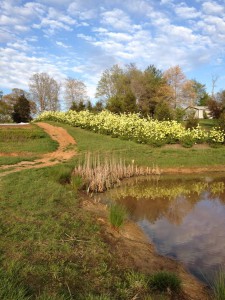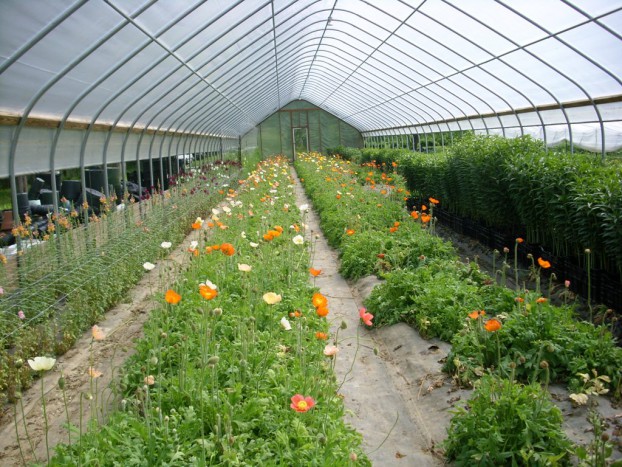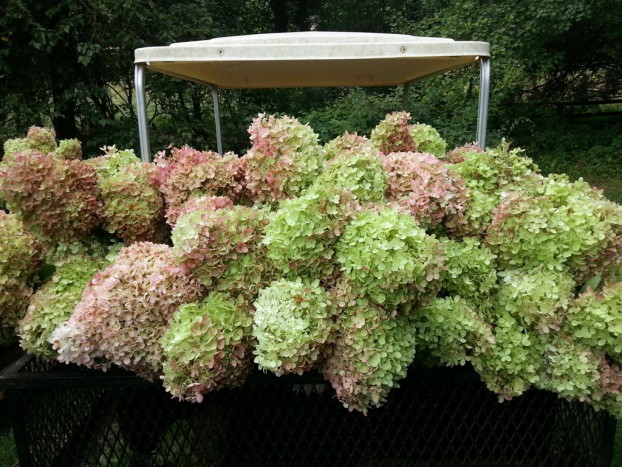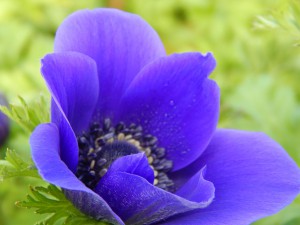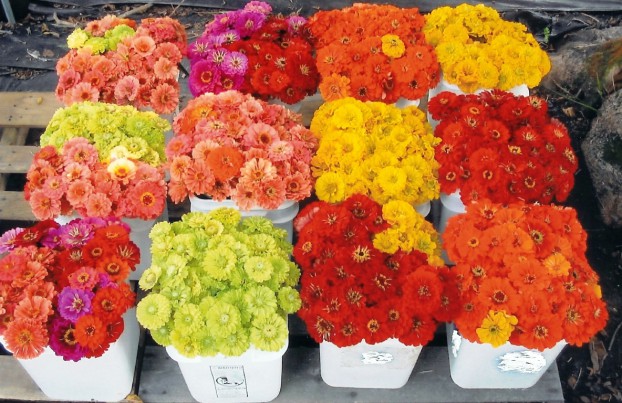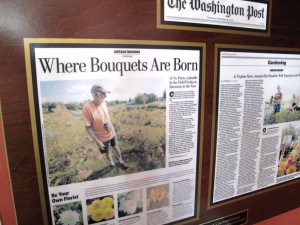Podcast: Play in new window | Download
Subscribe: Apple Podcasts | Podcast Index | RSS | More
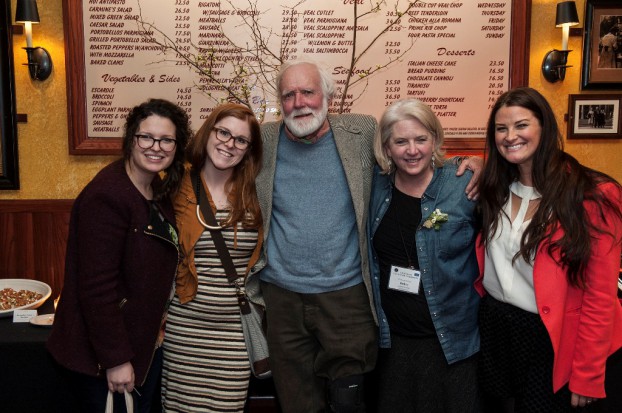
I’m so pleased that Slowflowers.com members Rachel Bridgwood and Lauren Anderson of Sweet Root Village (left) and flower farmer Bob Wollam of Wollam Gardens (center) joined Christina Stembel of Farmgirl Flowers (right) and me at a D.C. reception celebrating American Grown Flowers. (CCFC photograph, used with permission)
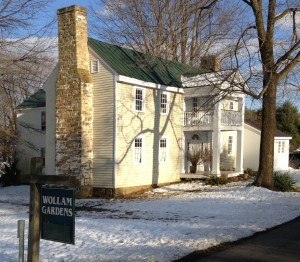
Today’s guest is Bob Wollam of Wollam Gardens, which serves florists, grocery stores, farmers markets and brides around the nation’s capitol.
I returned to Washington, D.C., this past week to join a delegation of flower farmers who invested their own resources of time and money to travel to our nation’s capital to meet with members of Congress and talk about the issues facing our industry.
First of all, I congratulate the folks who do this – they are the ones putting their money where their mouths are to elevate the awareness of policymakers who are in a position to make decisions that affect America’s flower farmers. I was honored to share this experience with them for the second year in a row. And for those of you who question why this is an important step to take, we have a lot of wins to point to.
For all of us, having the bipartisan Congressional Cut Flower Caucus, formed in 2014 and co-chaired four members of Congress who have flower farms in their districts – Lois Capps and Duncan Hunter from California, Jaime Herrera Beutler from Washington State and Chellie Pingree from Maine – means that there is now a tangible body of policymakers that you can ask your own elected officials to join. If you are interested in reaching out to your member of Congress, please contact me offline – and I will help you make that introduction. What is this Caucus doing? For one thing, we have them to thank for keeping the dialogue about seeing local and domestic flowers used for White House functions.
In 2015, the Congressional Cut Flower Caucus has been asked to join the Congressional Wine Caucus – one of the most popular of caucuses (right?) – to host an event where local wine and local flowers will be highlighted. I’ll keep you posted on that event because your participation will be needed to showcase your own region’s cut flowers.
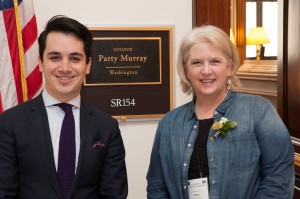
Kevin Stockert (left), a legislative aide for U.S. Senator Patty Murray (Washington), has invested time and interest in listening to and visiting flower farmers in our state.
Another important reason for these DC visits are the relationships that emerge. When you meet your elected officials, you never know what it will lead to.
For two years in a row, I’ve been privileged to meet with the agriculture policy staff of Senator Patty Murray.
Last year, after my fellow Seattle Wholesale Growers Market board members, flower farmers Diane Szukovathy and Vivian Larsen, and I made those connections, two of the Senator’s staffers took the time to visit our market, meet farmers and enjoy our local flowers. These folks want to know what their constituents are doing in areas such as sustainable agriculture, job creation, economic development and more. We’ve received offers of support for future projects, such as USDA Specialty Crop Block Grant funding we may seek, and I know I can speak for Diane and Vivian that we truly feel there is someone in our nation’s capital who will return a phone call or email and listen to a concern. That is priceless!
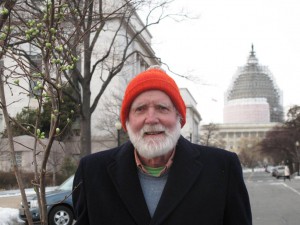
Bob Wollam brought his Virginia quince branches to Washington, D.C. — they added a lot of local beauty to the conversation at an evening reception!
While I was in DC, I couldn’t miss an opportunity to visit a local flower farm and interview a flower farmer, right? So please enjoy today’s conversation with Bob Wollam of Wollam Gardens, based in Jeffersonton, Virginia.
Bob joined the flower farmer Delegation to meet with his own Virginia congressman, as well as participate in meetings with other offices.
The amazing thing is that the staffers of members of Congress from many states live and work in our nation’s capitol, where Bob sells Virginia-grown flowers at the DuPont Circle Farmers’ Market (where he was a founding member).
So the dots were connected between LOCAL and AMERICAN GROWN – and why they are both so integral in saving our domestic cut flower industry. We suspect that these young legislative assistants will now come find Bob, seeking out the flowers he grows on land less than a 75-mile radius from DC. Like the other flower farmers in our group this past week, Bob is the face of the farmer; the face behind the poppies, ranunculus, anemones, tulips, sweet peas, peonies, hydrangeas, viburnum, dahlias and more. Here’s some more background on our guest today:
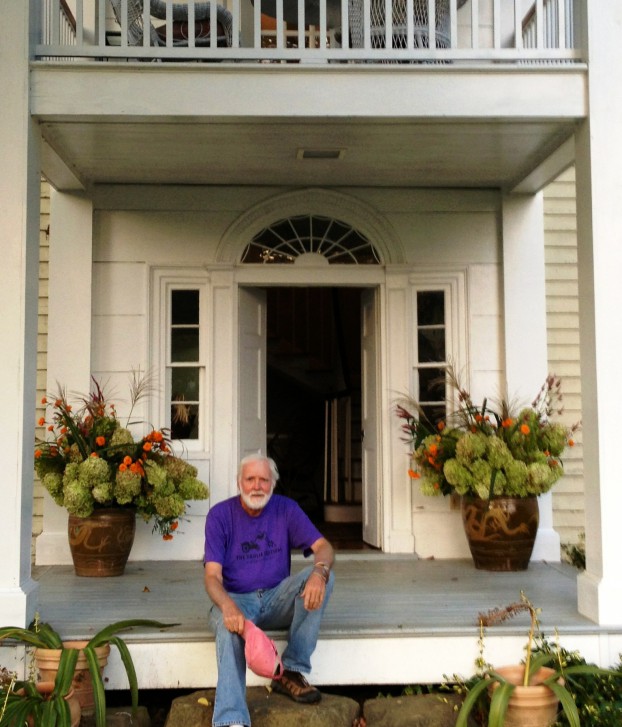
Bob Wollam, seated on the front porch of the historic farmhouse in Jeffersonton, Virginia where Wollam Gardens is based.
Bob Wollam has now been a flower farmer for 21 years. While he will be quick to tell you he had an exciting life before 50, he’ll be even quicker to tell you his addiction to beautiful cut flowers has been nothing but thrilling — and he intends to continue the addiction well into his nineties.
In 1987, Bob Wollam moved to Washington, D.C. This was his first step of an old dream of being a flower grower. Two years later, he asked a realtor in Warrenton to show him land in Virginia. He said he wanted at least 10 acres and an old house. He purchased his historic Farm House with a pre-Revolutionary history and of course 11 acres of farmland in the hamlet of Jeffersonton.
For three years, Bob grew perennials which he sold at the Alexandria, (Virginia) Farmer’s market. After seeing a small “cut your own” garden during a trip to Central NY, he shifted his energy into cut flowers. Bob began selling to florists in Washington DC and adding more farmers’ markets near, or in, the city. He initiated an internship program in 1994 and has hosted adventurers and flower lovers from around the world. Many of those are still active in cut flowers, some on their own farm.
In the winter of 2006-2007 he developed a 25 year plan for his flower farm and is well on the way to implementing that plan. Bob is driven to grow unique, difficult to grow and difficult to ship cut flowers for specialized florists, designers and farmer’s market customers.
With no background in agriculture except a gene handed down from both grandparents, Bob has turned Wollam Gardens into an exceptional destination for flower lovers. He learned quickly by reading everything he could find and with the guidance of other cut flower farmers who are part of the ASCFG (the Association of Specialty Cut Flower Growers), an association for which Bob served as a 2-term President.
Wollam Gardens now grows over 80 varieties of cut flowers on 11 acres, plus a few acres on his neighbor’s land. In addition 4 cold frames for growing cool season plants like stock, campanula, delphinium, ranunculus, and the well-known Temptress poppies, Bob has a continuing interest in flowering shrubs as cuts (quince, hydrangea, physocarpus, and viburnum), as well as fragrant bulbs (Oriental lily, Mexican tuberose), and, of course, close to 9000 dahlias.
During the season, Wollam Gardens is open to the public for customers who wish to purchase flowers and plants, Monday through Saturday 9-5, and for wedding and event consultations. People are welcome to stroll the property and look for one of the crew or interns to help with their flower needs!
Eventually Bob hopes all sales will be from the farm. Today, he also markets flowers to 15 florists in the DC metro area as well as at 5 area farmer’s markets.
Wollam Gardens’ flowers can be found at select Whole Foods stores in Virginia, Maryland and DC during the most abundant growing months of the season.
New this season, Bob is in the process of restoring a beautiful pavilion using cedar logs harvested directly from our property! It will be an artistic, rustic, and charming venue that will add even more character to this green space.
Thanks for joining me this week and please return again, as I continue to share insightful and educational episodes recorded exclusively for the Slow Flowers Podcast.
I’ve been on the lookout for good news, wishing to focus on the positive connections in my life rather than those that are less-than-positive. One of those pieces of good news fell into my in-box a few days ago and I just have to share it with you. I hope it makes you smile as much as it did me!
Here’s what my friend wrote: “Funny coincidence. Our mutual friend (let’s call her Susan) has been doing a little online dating. Yesterday for their first meeting, she had lunch with a retired lawyer who . . . is getting into gardening as a second career. He is taking a propagation course at a Horticultural College in preparation for creating a slow flower and herb farm. He began by telling Susan how inspired he has been by Debra Prinzing, the Godmother of the “Slow Flower” movement. He had even brought along a printout of one of your recent online interviews. Susan really surprised him when she told him that she was friend and that you had visited our town and its gardens several times! Boy, that really boosted his estimation of Susan. He wants another date, this time to a public garden or arboretum. So your work is paying off not only in better flowers, but also in better romance!
That was the best news I heard all week and I thank my dear friend who sent me that note!
Thanks to listeners, this podcast has been downloaded more than 36,000 times. Last week’s downloads were more than 1,100, our highest ever since this podcast started in July of 2013.
If you like what you hear, please consider logging onto Itunes and posting a listener review.
Until next week please join me in putting more American grown flowers on the table, one vase at a time.
This podcast is brought to you by Slowflowers.com, the free, nationwide online directory to florists, shops, and studios who design with American-grown flowers and to the farms that grow those blooms. It’s the conscious choice for buying and sending flowers.
And a special thanks to our lead sponsor for 2015, the California Cut Flower Commission, committed to making a difference as an advocate for American Grown Flowers. Learn more at ccfc.org and American Grown Flowers.
The slow flowers podcast is engineered and edited by Andrew Wheatley and Hannah Holtgeerts. Learn more about their work at shellandtree.com









